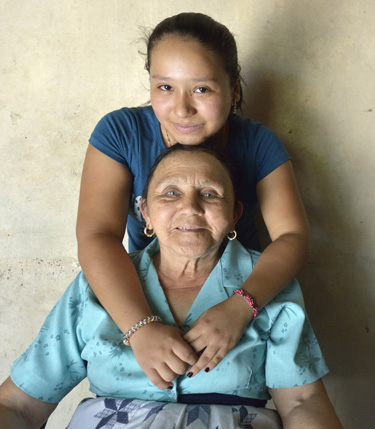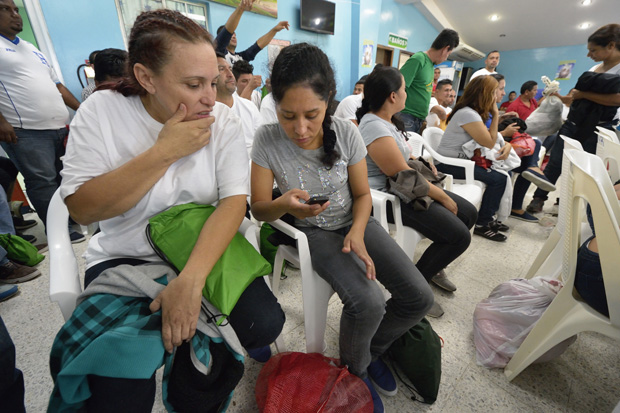
Aleska Garcia, 17, poses with her grandmother, Petronila Reyes, at their home in Goascoran, Honduras, Dec. 13. The teenager left Honduras in June 2014 to travel north to be with her mother, who has lived in the United States for 12 years, but she was detained by Mexican immigration officials and returned to Honduras. For now she says she wants to remain at home and finish her high school studies. (CNS photo/Paul Jeffrey)
GOASCORAN, Honduras (CNS) — This is where immigrants come from, a place where decades of war, corruption, hurricanes and drought have combined to make life untenable for many. And so they have gone away.
Although some have immigrated to Spain and other places, most have gone to the United States, following a well-worn route north through Guatemala and Mexico. But that’s a perilous undertaking, and those who remain are cautioned not to underestimate the dangers.
“We try to let people know the risks they’ll confront on the journey north. But even though they acknowledge they may die trying, we can’t say don’t go. It’s their right, and for many there’s no hope left here. There’s simply too much poverty,” said Heraida Ramirez, who heads the Committee of Migrant Families, a local group formed by the San Geronimo Catholic Parish.
Throughout Honduras, migrants are taking the lead in the church’s immigration ministries. In Goascoran, which sits on the border with El Salvador, the church formed three groups.
Ramirez’s group does public education and advocacy around migrants and migrant families, sponsoring immigration workshops in the schools and a yearly Via Crucis along the Pan-American Highway, focusing on the suffering of migrants passing through the zone.
A second committee provides support for families who have had relatives disappear on the way north. A third committee focuses on combating human trafficking, particularly at the nearby border crossing at El Amatillo.
[hotblock]
“The church is called to place itself at the side of the most poor. In many of our communities, those are the migrants and their families. The committees are a way that the church helps migrant families to have a voice and make change in favor of the poorest among us,” said Sister Loreta Briere, a Canadian member of the Sisters of Our Lady of the Holy Rosary who coordinates the parish’s immigration ministries.
Karen Valladares, executive director of the country’s National Migration Forum, said the local committees are playing a critical role in accompanying families of migrants.
“Many times families don’t know where to turn when there’s a problem. The mayors’ offices don’t know what to do when the body of a migrant needs to be repatriated, for example, or a migrant comes home disabled and needs help obtaining a prosthesis, but the committees can make that happen,” Valladares said.
In Goascoran, the committee carried out a census. Ramirez said that while 8,000 people live in the community, another 3,000 have left as migrants.
“We went door to door to door to talk with people, and just about every house has a migrant living abroad,” said Ramirez, whose sister Sandra has lived in Los Angeles for the past 25 years. “She doesn’t have any papers, so when my mother and father died, she couldn’t come back. She cries on the phone with me when we talk about our family.”
Lorena Euceda, a teacher who heads the anti-trafficking committee in Goascoran, said the demographics of migration have shifted over the years.
[hotblock]
“First the men left, and the women stayed behind alone. The birth rate dropped and we had fewer children in the schools. Then the mothers started going. And now the children are leaving. Their parents are sending for them, paying coyotes to take them north. I explain the dangers, but they insist on going,” she said.
“First the men left, and the women stayed behind alone. The birth rate dropped and we had fewer children in the schools. Then the mothers started going. And now the children are leaving. Their parents are … paying coyotes to take them north. I explain the dangers, but they insist on going,” said one teacher.
Euceda said school officials promised the children that if they were returned home, their teachers would help them make up for the school they missed while traveling north. Yet so many did not return that schools had to make adjustments. In the nearby drought-stricken village of Los Horcones, so many children left for the U.S. that the school closed last year. The few remaining students have to walk to another community for classes.
For those who insist on leaving, Euceda and the others attempt to equip them with basic survival strategies. For example, they tell them not to write down any phone numbers.
“If you’ve got a phone number written down and you’re kidnapped, your captors can call that number and demand ransom. So we tell people to memorize the phone numbers they’ll need and not to share them with anyone,” Euceda said.
The exodus of children in the middle of last year was spurred by false information that originated with those who earn their living smuggling migrants, known locally as coyotes.
“The coyotes were spreading the word that it was easy to get across the border and so people had to hurry,” said Carlos Hernan Carmona, president of the committee of people with disappeared family members. “But it was lies. The coyotes tell you a lot of beautiful things, like that you’ll ride the whole way in buses with good food. But in fact you will go hungry and end up walking for hours and hours through the brush or the desert.”
One of the Goascoran adolescents whose family was convinced by the rumors was Aleska Garcia, who was 16 in June when she headed north with a coyote paid $6,000 by her mother, who has lived in the U.S. for 12 years. On her first day in Mexico, Garcia was apprehended by immigration police, detained for a week in crowded facilities, then deported home. Yet a cousin traveling with Garcia made it safely to her family in the U.S.
The experience has convinced Garcia to stay home for now.
“I don’t want to do that again. I want to finish high school, then enroll in computer classes at the university,” she said. Her mother will continue sending money every month to the girl, who lives with her grandparents.
Her grandmother, Petronila Reyes, is glad the girl is back.
“I was sad when my granddaughter left. She has grown up with us old people. When I heard she was detained in Mexico I cried. But thanks to God she made it back exactly the same,” Reyes said.
PREVIOUS: World without mothers would be inhumane, lacking tenderness, pope says
NEXT: At Honduran airport, church workers welcome migrants deported from U.S.



Share this story